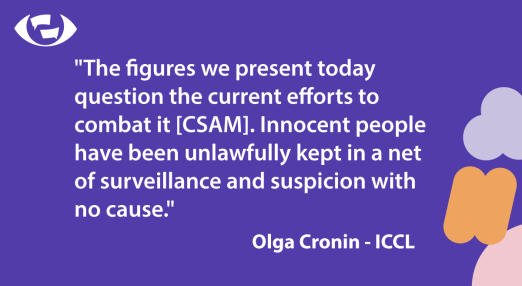Highlights
Filter by...
-

EDRi-gram, 29 March 2023
Last week, with a close circle of friends and supporters in Brussels, EDRi celebrated twenty years of defending and advancing digital rights across Europe. It was an evening full of reflecting on our journey and successes and also building hope and strategies for the future of Europe’s digital rights movement. A huge thank you to everyone who joined us for making the celebration truly special! In this edition of news from the digital rights world, read about a new Brussels-focused campaign against mass facial recognition. Residents of the Belgian capital can join the initiative and demand that the Brussels Parliament bans these intrusive and discriminatory practices. We also explore the concerning revelation that unverified information such as “social media profiles and phone contacts” are being used for the purpose of deportations, according to an internal European Commission assessment.
Read more
-

EDRi-gram, 15 March 2023
Last week, on International Women’s Day, EDRi’s Sarah Chander and Claire Fernandez were honoured as leading voices for change in the European Union and tech and digital rights space. Join us in celebrating them and all women! In this edition, amongst other digital rights updates, check out our position on the proposed European Health Data Space. This attempt by the European Union to better use health data could come at the cost of patients’ right to privacy and consent. You can also catch up with your favourite #PrivacyCamp23 sessions by reading the summaries below or watching the recordings online.
Read more
-

Poll: Young people in 13 EU countries refuse surveillance of online communication – Press Release
According to the results of the survey, 80% of young people aged 13 to 17 years old from 13 EU Member States would not feel comfortable being politically active or exploring their sexuality if authorities were able to monitor their digital communication, in order to look for child sexual abuse.
Read more
-

EDRi-gram, 1 March 2023
In this edition of the EDRi-gram, we celebrate the success of EDRi’s member in the Czech Republic against the use of Google analytics in state services. We are also exploring the consequences of internet restrictions for people imposed by the Turkish government to silence criticism. You will also find the Stop Scanning Me movement’s recently launched petition enabling people to fight against the European Union's attempt to scan every move we make online. Join us!
Read more
-

EDRi-gram, 16 February 2023
In this edition of the EDRi-gram, we invite you to join us in celebrating EDRi’s 20th birthday by reading our impact journey and sending us your wishes and vision for the future of digital rights. In our digital rights news updates, we are looking at the Serbian government’s second attempt to legalise biometric mass surveillance. We are also exploring how TikTok’s new feature will use your emotions to make even more profit.
Read more
-

EDRi-gram, 1 February 2023
In this first EDRigram edition of 2023, we want to take a look back at what we collectively achieved in 2022. Together, we mobilised people and organisations in key moments and continued to strengthen our network and to contribute to the design of a decolonising programme for the field. We are also exploring why the European Commission's blocking obligations for internet services providers in the context of addressing the spread of child sexual abuse material online are impossible. Stay tuned: Today, the European Parliament is voting on the regulation on the transparency and targeting of political advertising proposal which aims to tackle data-driven vote manipulation.
Read more
-

EDRi-gram, 14 December 2022
192 organisations and individuals call on the EU to better address the harms of Artificial Intelligence in the AI Act when used in the context of migration. We also celebrate our members' win as, thanks to their complaints, the EU watchdog has found that the European Commission has failed to protect human rights from its surveillance aid to African countries.
Read more
-

EDRi-gram, 30 November 2022
In this edition of the EDRi-gram, we share with you how the #ReclaimYourFace celebration in Brussels went. 20+ activists from across Europe came together to reflect on a wide range of decentralised actions that made the campaign a success. We're also looking at the joint action of 100+ organisations, calling on the European Parliament and Council to enable a more sustainable use of electronic products and devices with a universal right to install and run any software on any device.
Read more
-

EDRi-gram, 16 November 2022
In this edition of the EDRi-gram, we cheer as Austria becomes the first country to take a clear stance against the European Commission’s controversial proposal for a child sexual abuse regulation, which threatens to undermine people's right to privacy and freedom of expression. We also follow Panoptykon's, EDRi member in Poland, application against the Polish state for violating their right to privacy by allowing the intelligence agencies to act beyond scrutiny.
Read more
-

Position paper: A safe internet for all – Upholding private and secure communications
Despite the importance of its goals, the European Union’s proposed Child Sexual Abuse Regulation (CSAR) will not only fail in its aims to protect young people, but it will also even harm those it wants to protect.
Read more
-

News from Ireland question effectiveness and lawfulness of online scanning for tackling child sexual abuse: Lessons for the EU
An investigation in Ireland published today shows that tools for scanning private communications to detect child sexual abuse material (CSAM) online suffer not only from low accuracy and high rates of false alarms but have led to people’s data and privacy being put in danger without reasonable suspicion.
Read more
-

EDRi-gram, 28 September 2022
We celebrate the ruling of the Court of Justice of the European Union that the general storage of data undermines people's right to privacy and data protection. We're also exploring how a community-focused project enables young people to defend their online privacy.
Read more
